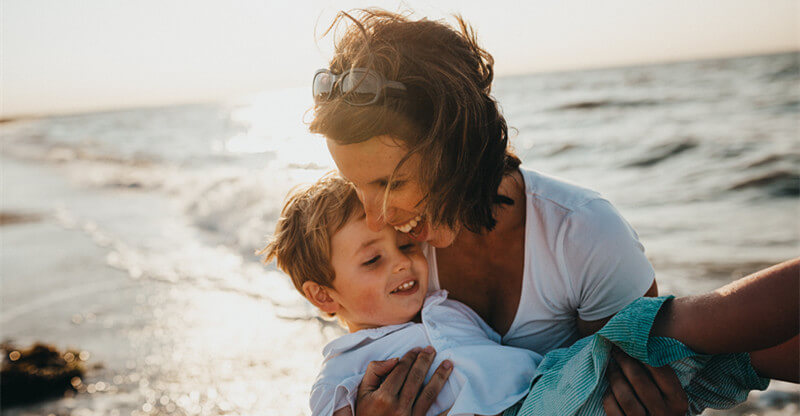The Trick to Raising Healthy and Happy Children
It seems that over the past half-century, children and young adults in the United States have grown increasingly anxious and depressed. According to NPR, their lives often feel out of control. Unfortunately, many times, the problems begin with parents. It’s not exactly what most parents want to hear, but it’s a reality many have to face.
We tend to live in a world where children are getting fewer choices than before. Instead, parents are micromanaging everything about their lives, from the extracurriculars they take part in, to the relationships and friendships they have at school.
That takes away from a child’s ability to be self-driven. So, as they get older, they simply aren’t able to take control of their lives, because everything has been done for them and every decision has been made.
As you might expect, that can lead to some anxiety issues. In fact, over 7% of kids between the ages of 3-17 have a reported anxiety disorder. That might not seem like much, but it equates to 4.4 million children in the United States.
So, as a parent, what can you do to raise happy, healthy children who are competent, confident, and kind?
Encourage Play and Creativity
Most of us think of children and the act of playing to go hand-in-hand. Unfortunately, that isn’t always the case nowadays. Thanks to the rising use of smartphones and tablets among children, there’s often less time for playing and creating.
Play is useful at any age. It teaches children social skills, builds self-esteem, allows them to stay physically active, and teaches them to better understand emotions. Playing in groups can be especially beneficial to children, especially if they’ve just gone through a traumatic event like a divorce between parents.
Play also lets kids use their imagination, but it doesn’t always have to be outside or on a playground. Encouraging your kids to use their imagination in other ways can be just as beneficial. One way to do that is to allow them to explore different creative outlets.
Some children are naturally drawn toward music. Others might be great artists who can create beautiful crafts and drawings. Whatever your child seems interested in, allow them to make their own creative choices. You might be surprised by the results.
Teach Them Responsibility
When you give your children responsibilities at home, you’re helping them to become more well-adjusted. They’ll tend to do better in school, and eventually in their careers and society as a whole.
The good news? You don’t have to go overboard with giving them things to do. Kids can start doing chores around the house at a very young age, as long as you give them tasks that they can handle. At three or four years old, they can start to pick up toys. When they’re a little older, they can clean up their own room.
Older kids can do things like vacuuming, dusting, or washing dishes. They can even help with sorting and folding laundry and putting it away.
You might experience some “feedback” from your children about their chores. Kids don’t always want to do them. But, by teaching them these skills, you’re not only showing them the importance of responsibility, but you’re gearing them up for life. The more they know about everyday chores within the home, the easier it will be for them to transition into the “real world” and take care of themselves.
Create Healthy Habits
Everyone wants their family to have the safest and cleanest living conditions. It all starts with the air we breathe. Essential oil diffusers are a very popular trend and safe for children over the age of six months. Let your children pick out their favorite scent or oil and put the diffuser to work together as an activity.
You will also need to play your role in keeping the air quality in your home safe by ensuring you have both your furnace and AC regularly serviced each time the season’s transition. A technician will also be able to identify things like a small carbon monoxide leak which can be a quiet and deadly killer.
You can teach your child about it by showing them your home’s carbon monoxide detector and by explaining that, similar to a fire alarm, if it ever goes off that means everyone needs to head outside, preferably to a pre-identified, safe zone that you practice going to with your kids.
Looking beyond your home’s air quality, there are many other things that can negatively impact your child’s health, and it’s no secret that germs are a big one. Children and germs go hand in hand, literally. You can make small tasks that lead to healthy habits a big deal to kids. This can boost their self-confidence and give them more control over their own life. Washing hands is one of the most common ways to prevent sickness, especially during flu season. It is also one of the easiest tasks a child can do on their own.
Eating dessert is a lot more fun than eating vegetables but the more colorful the plate the healthier it usually is. Children are constantly watching their parents to learn, if you’re following a nutritious diet then they are more likely to follow your example.
Avoid pushing your peas away, and consider a small garden, even if it lives inside on your windowsill, to make plants, and salads a fun and healthy part of your everyday life. With especially picky eaters, let them pick out their own salad dressing, and maybe a salad addition, like sunflower seeds or crunchy croutons to woo them into giving their veggies a try.
Don’t Be Ashamed When it Comes to Counseling/Therapy
Some parents don’t want to take their children to a counselor or therapist because of certain stigmas surrounding such things. It’s important that we destigmatize mental health treatments. With so many children struggling with depression and anxiety, sometimes childhood counseling is the best thing.
You have to look at your child’s individual needs and preferences. This can be especially important if they have a condition like ADHD or autism, and you tend to overcompensate for them. Therapy can help both your child and you learn how to express their emotions and how to behave appropriately in a variety of situations.
Counselors can help your child cope with everything from family issues to stress. They can even help with behavioral issues that your child may not fully be able to understand.
As a parent, it can feel overwhelming to always wonder if you’re doing the right thing for your children. But, you don’t have to be perfect. In fact, your expectations might be what harms your child the most.
If you want your children to be happy and well-adjusted as they get older, take a step back, give them a bit more credit and control, and do what you can to prepare them for the rest of their lives instead of making every decision for them. When you’re able to do that, they’ll have a much better chance of adjusting to society, relationships, and so much more.



